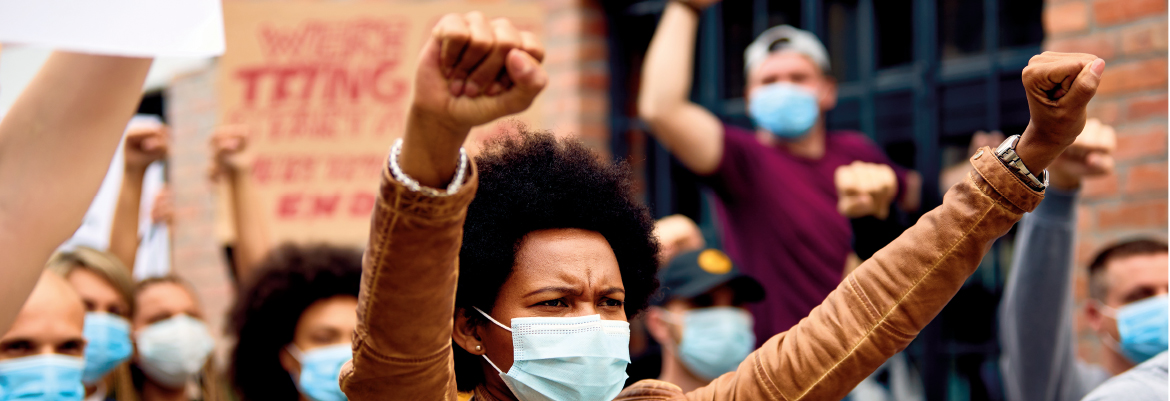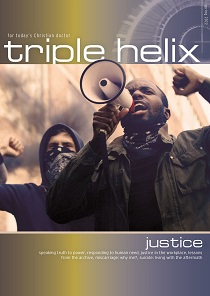If we accept that advocacy for justice on behalf of the poor and oppressed has an important role in our faith, then what is the most effective way to go about it?
Over the last couple of years, CMF's Global Advocacy Group (GAG) has been grappling with this in relation to advocacy for global health. In this article, we highlight our work.
The group was formed in February 2020 as a short-term working group to consider how to support CMF members working in resource-poor settings worldwide to engage in advocacy for those they serve. We also looked at whether CMF has a direct role in global advocacy. After an initial meeting at the CMF office in London, we moved to online meetings during the pandemic. We consulted members working internationally about their priorities for the group to consider and how we could pray for them. We also sought advice from the Tearfund Advocacy team.
The group has been directly involved in facilitating CMF global advocacy on three issues:
- UK Government support for the global response to COVID-19
- Global inequity in Covid vaccine access
- NHS charges for immigrants with insecure immigration status, including refused asylum seekers.
The work of this group has been, and continues to be, stimulating and challenging for those involved. Group members are aware that they have much to learn and are keen to receive feedback and ideas.
Neil Merrylees is a GP by training and Clinical Teacher in the Department of General Practice at Dundee University with a particular interest in Global Health.
Becky Macfarlane works as a speciality doctor in sexual and reproductive health in Glasgow with a background in general practice and a particular interest in the care of refugees. She is currently Chair of the CMF Global Advocacy Group.
COVID: UK government support for the global response
April 2020 CMF letter to the UK government Department for International Development (DFID) [3]
GAG expressed the following:
- Community Health and Primary Care workers in resource-poor settings face a lack of personal protective equipment during the COVID-19 pandemic and such basic hygiene necessities as running water.
- The importance of ensuring that all groups of the population receive appropriate care, especially the most vulnerable and marginalised.
- The provision of respiratory support equipment to many of the poorest countries where this equipment is totally lacking or in very short supply could extend the current efforts to produce ventilatory equipment once the projected UK requirements are met to produce a surplus that can be sent to areas of need.
- The provision of test kits: once the UK need for Covid test kits has been met, the increased production levels could be continued to generate a surplus to be deployed to developing countries.
May 2020 - DFID response:
The UK Government is putting £50 million into partnership with Unilever and NGOs [4] to fund handwashing and surface hygiene programmes to reach a billion people worldwide and provide over 20 million hygiene products in the developing world.
'Unlike in the UK, the weaknesses in health systems and limited access to health care in many developing countries mean that mechanical ventilators would benefit only a very small subset of patients.'
August 2020 - GAG reply:
We expressed concerns about the merger of the FCO and DFID to form the FCDO; [5] that this might downgrade the focus on global health-related issues.
Regarding the initiative with Unilever, we believed that 'investment in smaller local companies using local knowledge and innovation would increase sustainability and help the local economy.'
Provision still needs to be increased for patients who develop respiratory difficulties. This could include oxygen concentrators and CPAP equipment which requires a lower level of training than full mechanical ventilation.
COVID Vaccine Global Inequity
August 2021: GAG letter to Prime Minister and Foreign Secretary
Background:
Worldwide, by August 2021, there had been more than 4.67 million deaths directly attributed to COVID-19 or its complications. The devastating economic impact has disproportionately affected the poor and vulnerable, thereby widening global inequalities. Nowhere has this been seen more starkly than in the distribution and administration of Covid vaccines across the world. As of August 2021 only 0.5 per cent of vaccines administered globally had been given in low- or middle-income countries such as in Africa and the Middle East.
If this inequity remains, then:
- If rich countries continue to monopolise the first doses of vaccines instead of distributing them globally, there could be 'twice as many deaths' from COVID-19.
- Vaccine hoarding could cost the global economy up to $9.2 trillion. Rich countries will bear half those costs because of supply chain disruptions and demand shocks.
- Each new infection is an opportunity for mutation. Some mutations are proving more transmissible than other strains. This increases the risk of the disease evolving to an extent where current vaccines, diagnostics, and treatments no longer work.
Recommendations:
- Ensure the stockpiling of vaccines does not occur by immediately releasing any surplus supplies held by the UK.
- Demonstrate active logistical support for countries struggling with managing the roll out of vaccine programmes.
Correspondence with Gordon Brown
The letter was also copied to Gordon Brown given his well-publicised efforts for vaccine equity. Mr Brown responded with a supportive email and some valuable information.
NHS England charges for immigrants with insecure immigration status, including refused asylum seekers. The group considered the impact of these charges on deterring vulnerable immigrants from accessing healthcare, including maternity care. This issue was also a seminar topic at the CMF RASH course. [6]
CMF Global signed a letter to the Home Secretary early in the COVID-19 pandemic regarding prioritising public health over 'hostile environment' immigration policies, including healthcare charging. [7]
GAG also produced a briefing [8] and suggested points for writing to MPs for CMF members to encourage individual advocacy on NHS charging. [9]
NHS England charges for immigrants with insecure immigration status, including refused asylum seekers
The group considered the impact of these charges on deterring vulnerable immigrants from accessing healthcare, including maternity care. This issue was also a seminar topic at the CMF Refugee and Asylum Seeker Health course. [6]
CMF Global signed a letter to the Home Secretary early in the COVID-19 pandemic regarding prioritising public health over 'hostile environment' immigration policies, including healthcare charging. [7]
GAG also produced a briefing 8 and suggested points for writing to MPs for CMF members to encourage individual advocacy on NHS charging. [9]
CMF's Global Advocacy Group has produced a resource on advocacy in global health called The Advocacy Journey, which is available from the Bookstore cmf.org.uk/bookstore































